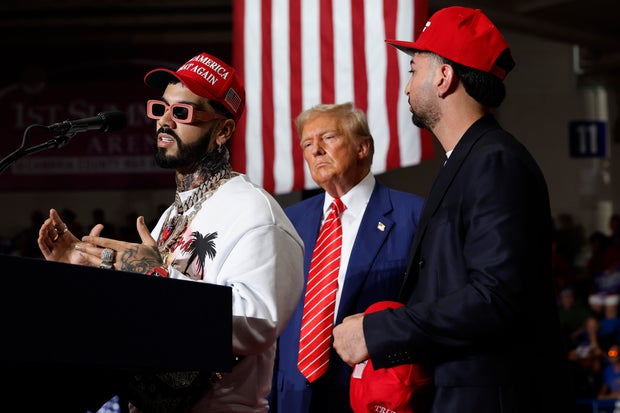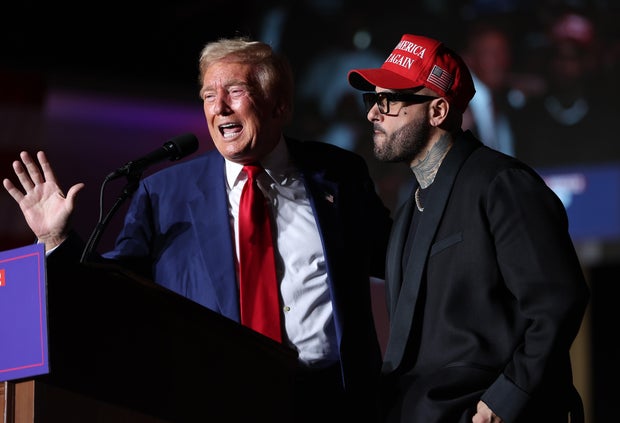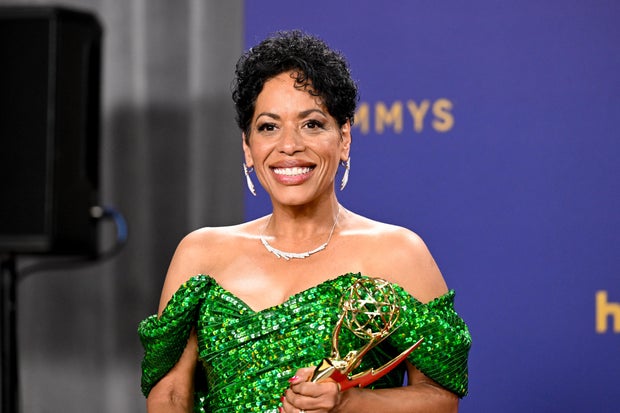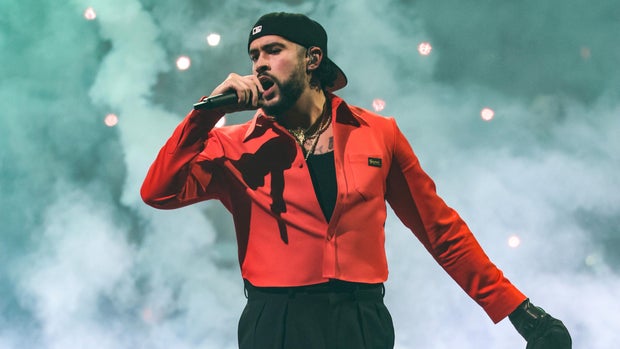The outreach to Latino voters by Republican and Democratic campaigns this year is especially noticeable in key battleground states where the Latino vote could be decisive for either party, and one of those states is Pennsylvania. It’s the biggest of the battleground states, with 19 electoral votes at stake, and it’s home to a sizable Latino community: 53% are Puerto Rican. The campaigns of both Vice President Kamala Harris and former President Donald Trump have been trying to connect with prominent Puerto Rican voices in the culture as a way to court a community that could prove decisive in November.
In August, Puerto Rican reggaeton artists Anuel AA and Justin Quiles joined Trump on the campaign trail at a Pennsylvania rally in late August. Anuel AA endorsed Trump and slammed President Biden before speaking directly to Puerto Rican voters.
“So, all my Puerto Ricans, let’s stay united — let’s vote for Trump,” he told the crowd, adding, “he wants to help Puerto Rico grow and succeed as a country.”
Chip Somodevilla/Getty Images
Anuel AA has four albums that have hit No. 1 on Billboard’s Latin albums chart, and has had sold-out tours in the U.S., South America and Europe, and Quiles has his own string of hit songs. But for those outside of the Latin music world, their names are relatively unknown, a point Trump himself made when introducing the two.
“I don’t know if these people know who the hell you are, but it’s good for the Puerto Rican vote. Every Puerto Rican is going to vote for Trump right now.” And a few weeks later, at a rally in Las Vegas, his unfamiliarity with another Puerto Rican artist, Nicky Jam, was evident.
Justin Sullivan / Getty Images
Trump exclaimed, “Do you know Nicky? She’s hot!” Nicky Jam is a man. Undeterred, Nicky Jam joined him on at the mic and told the crowd, “We need Donald Trump as president again.” This sparked an immediate backlash on social media among fans and fellow Latino artists who were both upset by the endorsement and who felt Nicky Jam had been insulted by the former president. Among those who criticized the artist was Mana, a Mexican rock band that removed a 2016 song with Nicky Jam and explained in a social media post that it “does not work with racists.” Nicky Jam ultimately took down his endorsement from Instagram.
Democrats have also been courting the bloc, deploying Puerto Rican actors who support Harris to a rally in Bethlehem, Pennsylvania, in September. Liza Colon-Zayas, known for her role in the series “The Bear” and Anthony Ramos, who was part of the original Broadway cast of “Hamilton,” both campaigned for Harris on the seventh anniversary of Hurricane Maria’s devastation of Puerto Rico.
Gilbert Flores/Variety via Getty Images
At the rally, Colon-Zayas reminded the crowd of the Trump administration’s response to the hurricane.
“We remember after Hurricane Maria devastated the island, Trump blocked billions of dollars in hurricane relief,” she said, adding, “He disrespected us — how he called Puerto Rico ‘dirty and poor’ and tossed paper towels at us.”
As president, Trump withheld $20 billion in hurricane aid for three years, arguing the money would just be funneled into paying off the island’s debt. A former Trump aide said that at one point, he even joked about a trade with Denmark: Puerto Rico for Greenland. In 2020, six weeks before the election, Trump released the aid.
Those slights against Puerto Rico are a major part of the criticism being leveled against the artists who endorsed Trump. Nicky Jam, Anuel AA and Quiles have seen their social media pages have been flooded with comments calling them sellouts or out of touch with their own community.
Ray Callazos, the Executive Director of UNIDOSUS, told CBS News, “Issues related to the island of Puerto Rico and the Puerto Rican community still resonate strongly with Puerto Ricans in Pennsylvania.”
Callazos observed that the types of Latino surrogates backing each campaign are “indicative of their target audience within the Latino community.” He adds that while Harris has “very mainstream Latino figures that appeal to an assimilated, English-speaking Latino,” Trump’s surrogates have “a more street brand, a very macho man brand that’s appealing to younger Latino men.”
It’s been noted that the dream endorsement would be Bad Bunny, a global superstar who not only enjoys support from those younger Latino men, but also has crossover appeal as a mainstream cultural icon.
Kevin Mazur/WireImage via Getty Images
Bad Bunny, a native of Puerto Rico, is no stranger to politics. He recently bought several billboards that heavily criticize the New Progressive Party currently in power on the island, saying a vote for them is a vote for corruption.
Many of his song lyrics criticize the ineffective response by the government in Puerto Rico to crises like the major hurricanes that have pummeled the island in the last few years. While it’s unclear who Bad Bunny would support in the presidential election, in 2017, during an interview with Billboard, he wore a shirt that seemed to take aim at then-President Trump. It read, “Are you a tweeter or a president?”
Trump has offered scant detail about what he would do for the Puerto Rican community if elected, but polling shows his wider message is resonating with Latinos.
A recent NBC/Telemundo poll of Latino voters found 40% of Latinos back Trump, an improvement from 2020, when he only received 32% of the Hispanic vote.
Callazo says that Trump is likely winning more support among Latinos by “targeting persuadable Latino voters on the margin,” like younger Latinos. He also says the campaign has also focused on conservative religious communities around social issues.
For her part, Harris has not articulated specific plans for Puerto Rico, either, and the Biden administration has faced its own challenges in addressing the island’s needs. In February, a government accountability report found that of the $23 billion in FEMA funding allocated to rebuilt Puerto Rico after a series of hurricanes and earthquakes beginning with Hurricane Maria in 2017, just $1.8 billion had been spent, and $11.3 billion still requires FEMA approval before it can be disbursed.
Puerto Ricans also want the government to crack down on wealthy American tax dodgers who have been speculating in real estate in Puerto Rico and are driving up housing costs for islanders, well beyond what they’re able to afford. Problems like these have driven complaints in the Latino community that politicians on both sides of the aisle only seem to care about Latinos when they need a vote, only to be forgotten until the next election cycle.
It’s impossible to say whether any of the artists weighing in on the 2024 election will make a difference at the polls this fall, but they are an indication of the different kinds of outreach the parties are trying to move Latinos to the polls.
Callazo says Puerto Rican voters he’s spoken to in Pennsylvania “want to be engaged authentically” and that they are “yearning for more outreach.” He added that both campaigns “need to invest more in direct voter contact that’s culturally competent that resonates with this particular kind of Latino voter in Pennsylvania.”
Christopher Brito
contributed to this report.





